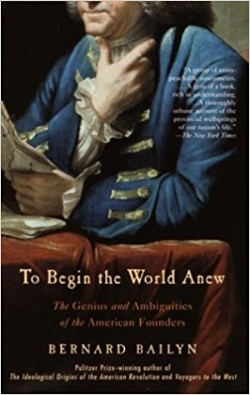To Begin the World Anew: The Genius and Ambiguities of the American Founders. By Bernard Bailyn. (New York: Knopf, 2003. x, 185 pp. $26.00, ISBN 0-375-41377-4.)
This review first appeared in in the Journal of American History 90, no. 3 (Dec. 2003), 999-1000.
< Back to book reviews listing
To Begin the World Anew: The Genius and Ambiguities of the American Founders
Bernard Bailyn
Reviewed by Michael A. McDonnell, University of Sydney
This new work has all the hallmarks of a Bernard Bailyn classic. It is beautifully written, concise, and full of illuminating insights and intriguing ideas. In a few brief essays, Bailyn explores the tensions between pragmatism and idealism in early American political life in his own contribution to the recent "Founders chic." Drawing first on the insights of the art critic Kenneth Clark, Bailyn probes for the sources of creative imagination and compares the Founding Fathers with outstanding provincial artists. The most skillful and creative artists at once reintroduce simplicity and common sense into their style and invigorate their work with a visionary intensity. True creativity thus flourishes on the margins. Bailyn explores this theme through a series of political sketches: Thomas Jefferson's tortuous struggle with the complexities and ambiguities of the Revolution's ideals as he sought, often unsuccessfully, to reconcile theory with practice; Benjamin Franklin's unique blend of realism and idealism in developing-and embodying-an American foreign policy (Bailyn provides a wonderful foray into the iconography of Franklin abroad); the frenetic efforts of the writers of the Federalist Papers to explore and explain a new and innovative balance between power and liberty; and, finally, the resonance of the results of those creative struggles throughout the Atlantic world.
As he always does, Bailyn leaves us wanting more. This is meant in the best sense in the three most original essays-on the creative imagination, Franklin, and the Atlantic dimensions of American political thought. Speculative more than persuasive, they are innovative in approach and packed with suggestive insights. But Bailyn's defense of Jefferson's efforts to reconcile policy with principles seems to this reader to be at times labored and not at all convincing. The chapter on the Federalist Papers adds little to what we know (though an interesting coda begins exploring the use of the Federalist in the Supreme Court). And if Bailyns essay on the influence of American constitutional innovation throughout the Atlantic world is one of the more original pieces, it is also the most disconcerting. Here Bailyn reveals that even he can be present-minded by ending his essay with a challenge to make constitutional principles and debates more relevant for our times. But Bailyn tips his hand still further and even worries that American constitutionalism, having "radiated throughout the Atlantic world [and] become the classic formulation for the world at large of effectiveness and constraint in the humane uses of power," is "now being questioned by people with other values, other aspirations, other beliefs in the proper use of power" (p. 149). What these "other" values, aspirations, and beliefs are, Bailyn leaves up to our imagination, or perhaps our reading of present-day global politics?
Quite apart from the message this sends out about the agenda behind Bailyn's present concern with Atlantic history, the passage also reveals the limits of his work. Bailyn is keen to engage with and reinvigorate the debate over constitutional principles, but he is not overly concerned with exploring the ideas of those "others" who challenged and continue to contest them. Even his discussion of Anti-Federalist thought is limited to a narrow band of elite Anti-Federalists whose position he virtually caricatures. But there were many Americans beyond Bailyn's purview who contributed to, but hardly benefited from, the creative genius of the Founding Fathers, thousands whose lives were doomed by the new principles enshrined in the Constitution. Though it would be wrong to criticize Bailyn for what he does not do, his casual dismissal of constitutional opponents, great and small, then and now, raises questions that he then refuses to tackle. The creative genius of the Founding Fathers did not ultimately produce a panacea for all political and social ills, which is precisely why so many voices, from within and without, challenged and continue to challenge, discuss, debate, and contest this "classic formulation."

